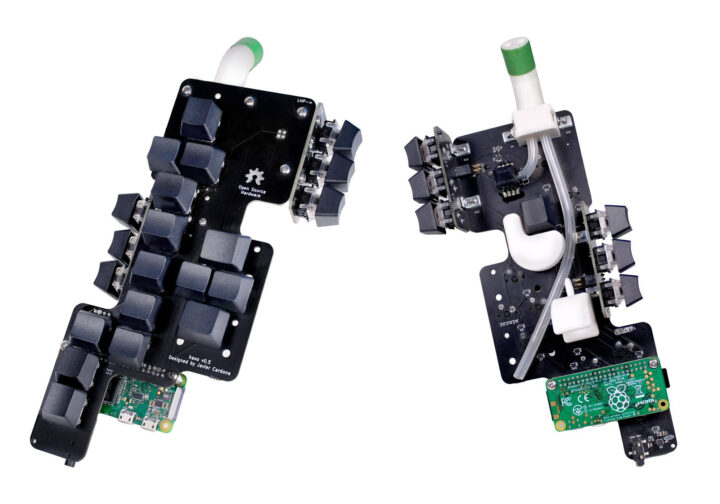The Haxophone is an unusual Raspberry Pi expansion board that transforms the popular SBC into a travel saxophone using mechanical keys.
The hackable musical instrument is open-source hardware and OSHWA certified and comes with mechanical keys which makes it easily repairable, customizable by changing keycaps or the firmware, and at a price point cheaper than commercial digital saxophones with custom molded keys.
Haxophone key features and specifications:
- Custom Raspberry Pi HAT PCB
- Tactile-feedback 5-pin mechanical switches
- Mechanical keycaps
- Airflow pressure sensor
- Built-in audio amplifier compatible with Raspberry Pi Zero and Zero W
- Serial console for hacking
- Weight – 180 grams
- OSHW certifications – PT000005
You’ll find KiCAD hardware design files, assembly instructions, documentation, and the software and firmware used with the Haxophone on GitHub.
There are two main software components, first haxo-rs Rust-based driver for detecting key presses and breath in order to convert them into notes, and fluidsynth synthesizer software for converting notes into sounds. You can watch the video below for a short introduction and demo of the Raspberry Pi-based saxophone.
The Haxophone works best with Raspberry Pi Zero or Zero W due to their smaller size and weight, but larger Raspberry Pi SBCs with a 40-pin GPIO header can also work.
Cardona Bits has just launched the Haxophone on Crowd Supply with a $15,000 funding goal. A $200 pledge should get you a fully assembled Haxophone HAT ready to be plugged into a Raspberry Pi which you need to purchase separately. Shipping adds $8 to the US and $18 to the rest of the world, and deliveries are scheduled to start by mid-February 2024.

Jean-Luc started CNX Software in 2010 as a part-time endeavor, before quitting his job as a software engineering manager, and starting to write daily news, and reviews full time later in 2011.
Support CNX Software! Donate via cryptocurrencies, become a Patron on Patreon, or purchase goods on Amazon or Aliexpress. We also use affiliate links in articles to earn commissions if you make a purchase after clicking on those links.






Wonder what software modifications would be necessary to allow other SBC’s with Pi Zero footprint (i.e. Radxa Zero or Mango Pi boards) to function with this.